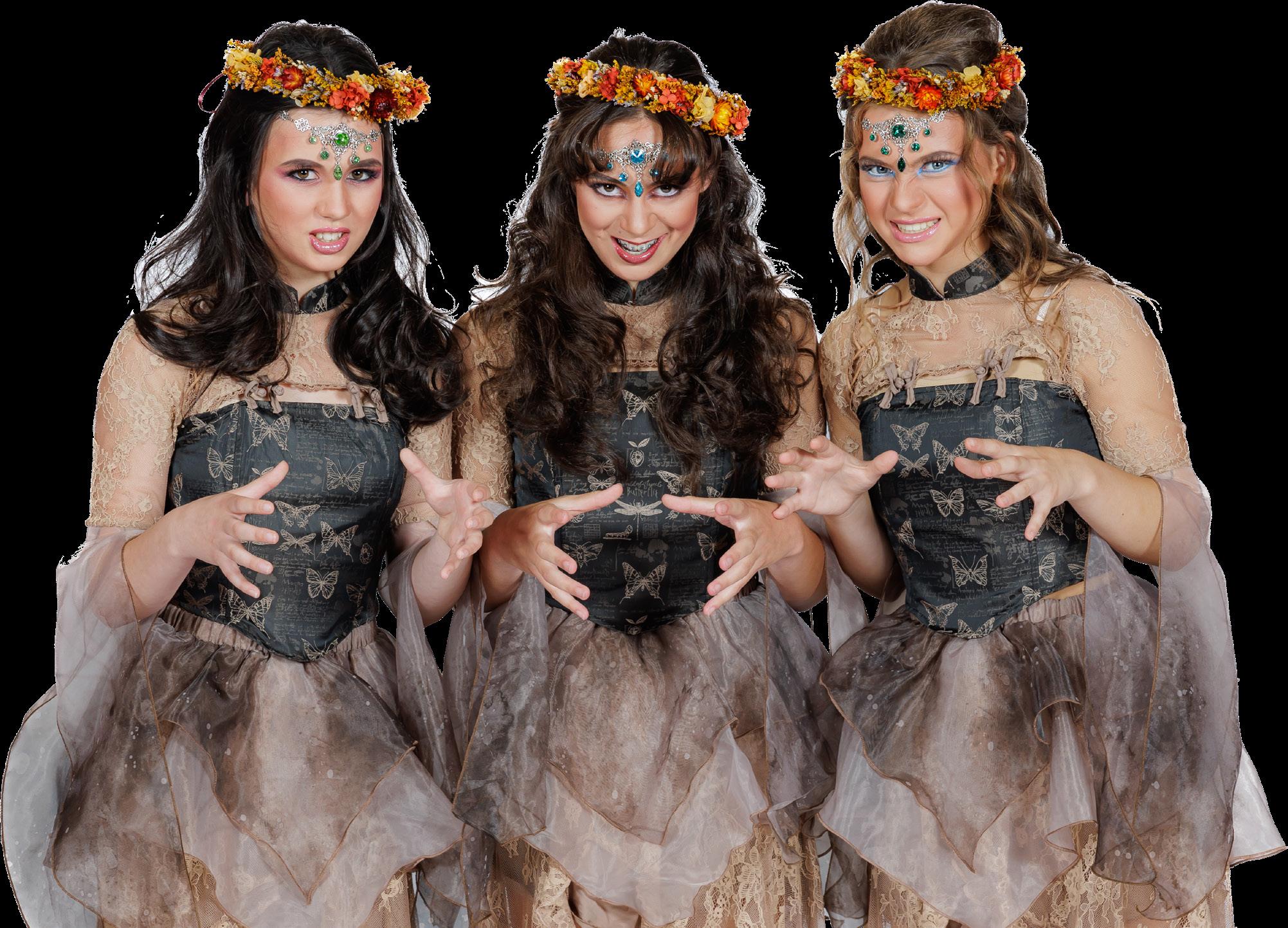

Fair is foul and foul is fair...

On a bleak Scottish moorland, a whispered prophecy incites an unstoppable chain of events. Three sirens rouse the dormant ambition of a brave and gallant soldier, Macbeth: the Thane of Glamis. Bolstered by the prophecy and his wife’s encouragement, he kills King Duncan and takes the throne. But as Lady Macbeth’s guilt catches up with her, her husband’s single crime becomes a cascading expedition into unrelenting tyranny.
Morality is put under the microscope in William Shakespeare’s examination of human temptation, ambition and greed, with the play being considered one of the greatest tragedies ever written.







Double, double... Macbeth Fun Facts
1. Lady Macbeth’s real name was ‘Gruoch’ and Macbeth’s real name was ‘Mac Bethad mac Findlaích’.
The story as told by Shakespeare is somewhat different from the historical truth. The real Macbeth killed Duncan in battle in 1040 and Macbeth (or Mac Bethad) went on to rule for 17 years, until he was killed and Macbeth’s stepson, known as Lulach the Idiot, became king (though he only ruled for less than a year – then Malcolm, as Malcolm III, took the crown). Unsurprisingly, the historical record is rather lacking in witches, and the idea of killing Duncan while the king was a guest in Macbeth’s own home was Shakespeare exercising his artistic licence.

2. Shakespeare talked up the role of Banquo in the play in order to flatter the reigning King, James I.
Banquo – the one-time friend of Macbeth who is murdered by him, but later returns to haunt Macbeth at the dinner-table – was made an important character in the play because King James I of England (James VI of Scotland), who had come to the throne a few years before Shakespeare wrote the play, claimed descent from Banquo. In Shakespeare’s play, Banquo is the man who the Witches prophesy will ‘get [i.e. sire] kings’, even though Banquo himself will not be King.
3. If you say ‘Macbeth’ in a theatre, you are meant to walk three times in a circle anti-clockwise, then either spit or say a rude word. The idea of the ‘curse’ of Macbeth has a complicated origin, though it was given a leg up in 1898 when novelist and wit Max Beerbohm put about the idea that the play was unlucky. That said, it has had its fair share of tragedies and disasters: in a 1942 production starring John Gielgud, four people involved in the production died, including two of the Witches and the man playing Duncan.

To mankind in general Macbeth and Lady Macbeth stand out as the supreme example of all that a host and hostess should not be.
– Max Beerbohm

4. In 1849, Macbeth caused a riot in New York. The Astor Place Riot was caused by two rival actors arguing about whose portrayal of Macbeth was better. American actor Edwin Forrest and English thespian William Charles Macready were both playing the role of Macbeth in different productions at different theatres on the same night, and a longstanding rivalry erupted. Another notable nineteenth-century production of the play (featuring acting rivalry) involves the so-called ‘worst poet in the English language’, who once played Macbeth on stage – and refused to die at the end. When William McGonagall – who has a reputation for being the worst poet in English – played the role of Macbeth in a stage production, he was so annoyed at being upstaged by his costar, who was playing Macduff, that when Macduff went to kill Macbeth at the end of the play, he found his foe mysteriously unvanquishable.

5. The phrase ‘steal my thunder’ comes from Macbeth.
But the phrase doesn’t actually appear in Shakespeare’s play. The phrase ‘to steal someone’s thunder’ originates in a production of the play from the early eighteenth century. In 1704, John Dennis invented a sound-effect for his play, Liberty Asserted, performed at the Drury Lane Theatre that year: a piece of sheet-metal used to simulate the sound of thunder. Liberty Asserted wasn’t a huge success and the play was taken off and replaced by that old favourite, Macbeth – complete with Dennis’ sheet-metal sound effects. Dennis, seated in the audience for the production of Macbeth, accused the theatre of stealing his thunder – and a new phrase came into being.


Production Team

Director
Production Coordinators
Costume Designer
Set and Prop Designer
Technical Coordinator
Movement Choreographer
Fight Choreographer
Lighting Designer
Sound Designer
Costume Technician
Lighting Technician
Lighting Assistant
Hair Stylist
Makeup Artist
Design Assistants
Production Consultant
Poster Designer Photographer
Filmed Sequences
Penelope Wood
Jessica Johnson
Elyse Carmichael
Jennifer Bennie
Mark Wager
Stuart Feldt
Andrew Howitt
Goran Banyai
Guy Carrison
Tara Suri
Breanna Handfield
Michael Zagarn
Lachlan Campbell
Kerin Barker
Martina Lindsey
David Bennie
Erica Moffat
Sam Gough
Simon Barry
Ken Nakanishi
Steven Thorne
Thank you
David Clark (Chartwells)
Friends of Performing Arts
CGS Maintenance and Facilities Departments
David McLean (Head of Drama, 2004-2007) for playing the ‘Armed Head’ Apparition with such panache!
Tech Crew
Showcaller
Stage Manager
Lighting Operator
Sound Operator
AV Operator
Stagehands

Curtain Operator
Camera Operator
Haydn Hammerton
Edward Pill
Rico Towers
Luna Robinson
Noah Catterall
Max Alexander
Thomas Klebanowski
William Nethercote
Lachlan Barnes
Liam Clarke
Ethan Chen
Sean Luo




We wish to acknowledge the traditional owners of the land upon which we are meeting, the Wurundjeri people of the Kulin Nation and we pay our respects to their Elders past, present and emerging.
